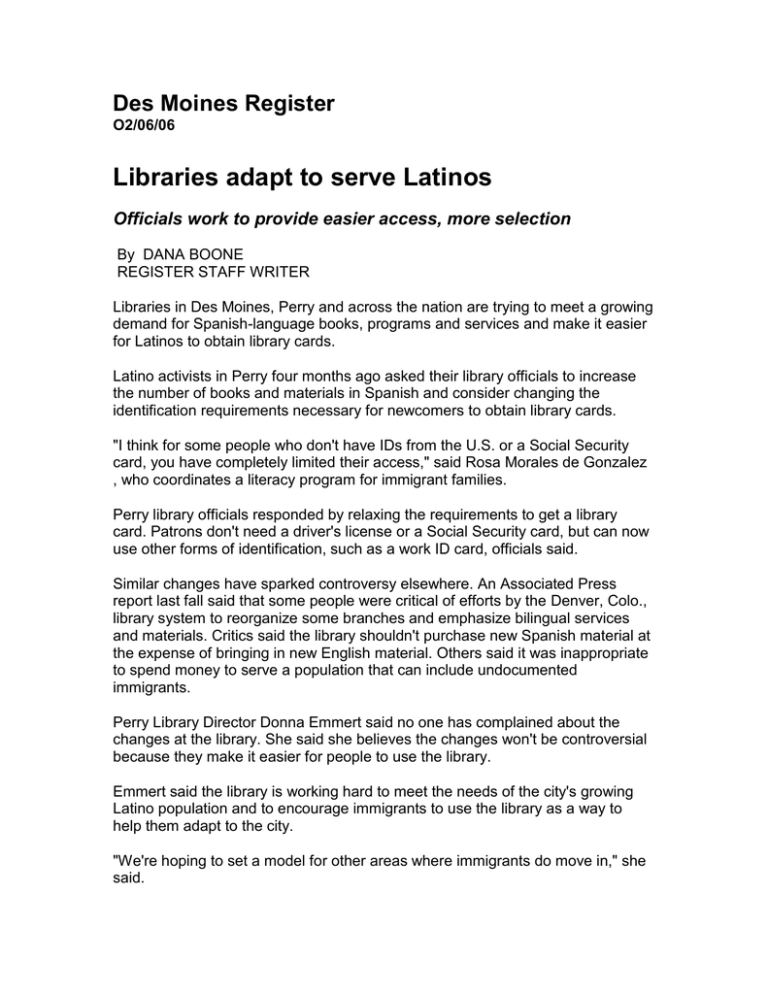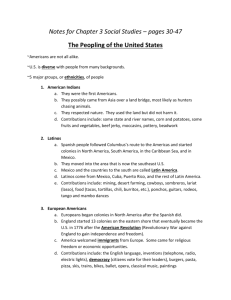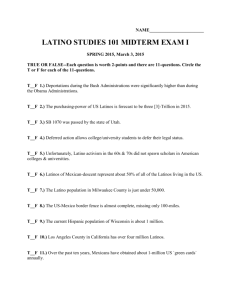Libraries adapt to serve Latinos Des Moines Register
advertisement

Des Moines Register O2/06/06 Libraries adapt to serve Latinos Officials work to provide easier access, more selection By DANA BOONE REGISTER STAFF WRITER Libraries in Des Moines, Perry and across the nation are trying to meet a growing demand for Spanish-language books, programs and services and make it easier for Latinos to obtain library cards. Latino activists in Perry four months ago asked their library officials to increase the number of books and materials in Spanish and consider changing the identification requirements necessary for newcomers to obtain library cards. "I think for some people who don't have IDs from the U.S. or a Social Security card, you have completely limited their access," said Rosa Morales de Gonzalez , who coordinates a literacy program for immigrant families. Perry library officials responded by relaxing the requirements to get a library card. Patrons don't need a driver's license or a Social Security card, but can now use other forms of identification, such as a work ID card, officials said. Similar changes have sparked controversy elsewhere. An Associated Press report last fall said that some people were critical of efforts by the Denver, Colo., library system to reorganize some branches and emphasize bilingual services and materials. Critics said the library shouldn't purchase new Spanish material at the expense of bringing in new English material. Others said it was inappropriate to spend money to serve a population that can include undocumented immigrants. Perry Library Director Donna Emmert said no one has complained about the changes at the library. She said she believes the changes won't be controversial because they make it easier for people to use the library. Emmert said the library is working hard to meet the needs of the city's growing Latino population and to encourage immigrants to use the library as a way to help them adapt to the city. "We're hoping to set a model for other areas where immigrants do move in," she said. The trend is happening elsewhere across the country as libraries try to improve accessibility for Latinos, boost their collections and add bilingual staff, said Laura Maldonado , president of the Washington, D.C., metro chapter of REFORMA, the National Association to Promote Library and Information Services to Latinos and the Spanish-Speaking. In Perry, before the policy change, undocumented immigrants lacked the forms of identification that the library requested. "The main goal is to get people in and yet still have some access to a location if we need to call them and tell them we have some materials for them or if there's an overdue book," Emmert said. "We do have to have some responsible way of tracking our materials when they're out of the building." Now, undocumented immigrants can use a Tyson pork processing plant ID card, for example, to get library cards for themselves and family members, Emmert said. "If that one person in the family has some ID that's reasonable, then other family members could attach to that and then have access to the library and be able to use our materials," she said. "They could bring their children in and use the library so they can all begin on literacy." Des Moines' libraries require proof of address and a picture ID to obtain a library card. The online application also asks for a Social Security or driver's license number, but it's not required, officials said. Carol Brey-Casiano , immediate past president of the American Library Association and director of the El Paso Public Library in Texas, said libraries are improving services to Latinos by allowing newcomers to obtain library cards with alternate forms of identification, offering English as a second language classes and adding Spanish-language materials. "Many immigrants coming from other Spanish-speaking countries do not have the kind of library tradition that we have," she said. "Part of our job as librarians is to reach out and explain and invite them to come into the library." Iowa's Hispanic population grew 26.2 percent, to an estimated 104,119, between 2000 and 2004, according to the latest Census data. Projections show the state's Latino population will grow to 269,830 by 2030. Perry's Latino population also has increased, from 47 people in 1990 to 1,873 counted in the 2000 census. In Des Moines, Spanish-language materials are being moved to the front of the library to improve access. Signs will be posted in Spanish, said Lorna Truck, deputy library director. Neither the Des Moines nor the Perry library has information about the libraries in Spanish on its Web site. Rosa Morales de Gonzalez , who works for Iowa State University Extension, leads a storytelling program for immigrant families in Perry. She said the library has done a good job of adding more Spanish books and now has about 600 Spanish language titles. The children's section has been expanded. "The kids get really interested in reading more books and spending more time reading," she said.



